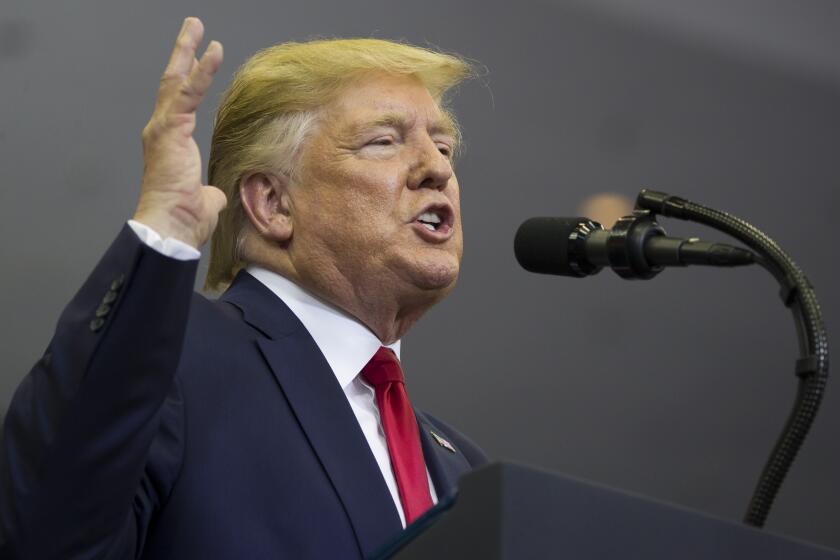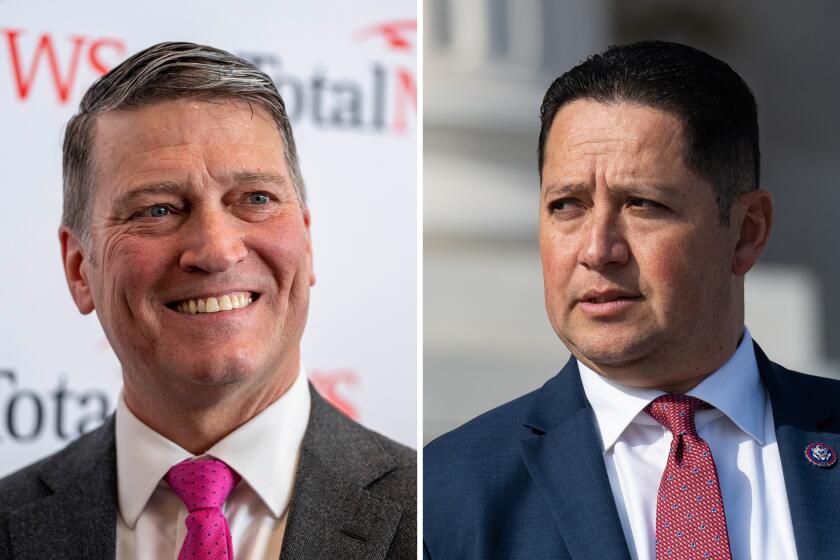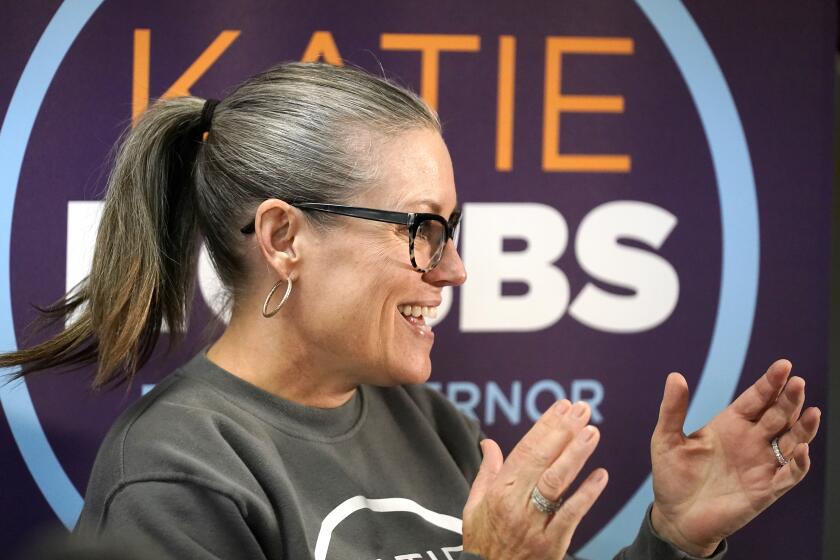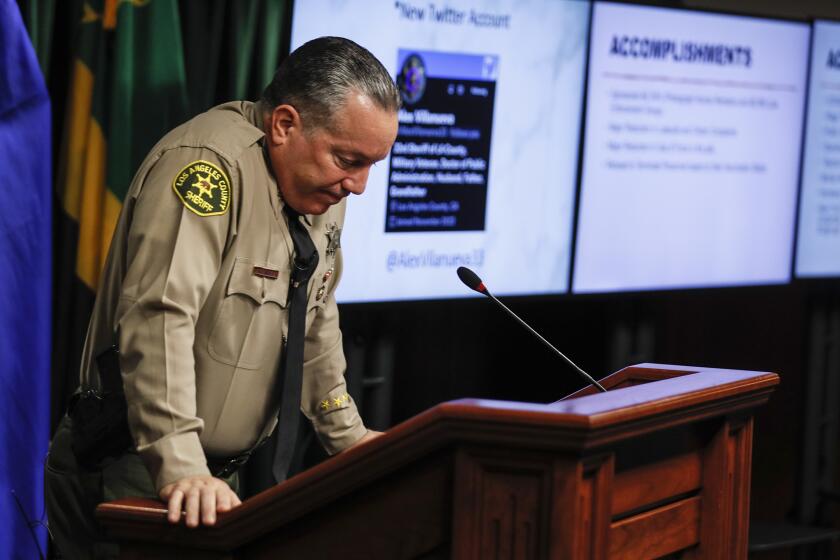Column: There’s a price for parroting Trump’s Big Lie. Will Republicans care?
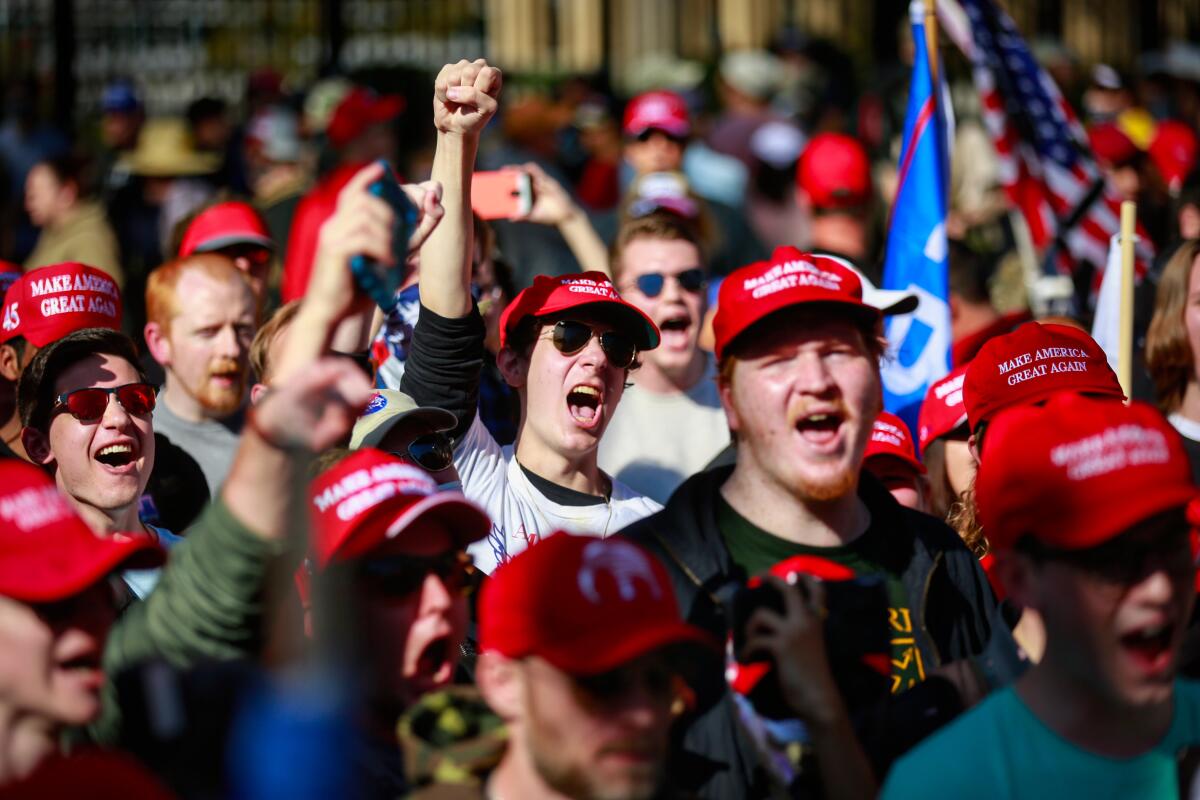
- Share via
In the Book of Republican Sorrows, 2022 merits a whole chapter of its own.
With inflation scraping the sky and President Biden’s approval ratings deep in the dumpster, the GOP was primed to seize control of the Senate, blow the doors off the House and greatly raise its ranks in state capitals across the country.
One big reason was the lousy crop of candidates fielded by the GOP, many of whom sacrificed truth and personal integrity by parroting former President Trump’s “Big Lie” about the 2020 election being stolen.
Shameful, yes. But did their bad behavior make a difference in the 2022 midterms? A new study, conducted by researchers at Stanford’s Graduate School of Business, suggests: Indeed it did.
Assaying the general election results in 85 races across the country, the study found that election-denying Republicans received 2.3% less support in statewide contests than Republicans who stood fast and refused to indulge Trump’s insidious blather.
That may not sound like a lot. But it was the difference in several close contests involving prominent election deniers, including races for U.S. Senate and secretary of state in Nevada, and governor and attorney general in Arizona. In each of those elections, scoundrels and cheats — let’s call them what they are — went down to narrow, deserved defeat.
A Stanford professor and colleagues offer a point-by-point refutation to fight the falsehoods.
Looking ahead, the study notes the 2.3% underperformance penalty for lying about the election was also larger than the margin of victory in several 2020 presidential battlegrounds — including Georgia, Pennsylvania and Wisconsin — “suggesting that nominating election-denying candidates in 2024 could be a damaging electoral strategy for Republicans.”
(At least in the general election. The research — which analyzed races for U.S. senator, governor, attorney general and secretary of state — was inconclusive when it came to Republican primaries, where the results were mixed; a number of election-deniers were nominated while others lost.)
Much was said and written following the midterm elections, in a collective exhalation of relief, after the highest-profile election deniers were defeated in several key states. And the outcome was important and beneficial.
The Stanford study, though, takes a bit of gloss off the uplifting narrative — voters rise up, save democracy! — suggested by that (mostly) happy ending.
In 2022, a disgraced ex-president and serial bankrupcty-filer again demonstrated his reverse-Midas touch.
As researchers pointed out, the falloff in votes for those knifing our country in the back “is small enough to suggest that many voters were willing to continue support[ing] Republican candidates even if they denied the results of the 2020 election.”
Not a great testament to truth, justice and the American Way.
On the other hand, as the study’s co-author, Stanford political scientist Andrew Hall, emailed in a follow-up interview, “It is probably unrealistic to expect large numbers of voters to sacrifice their priorities on other pressing issues (like the economy, social issues, etc.) to punish these candidates.”
“It is perhaps heartening,” he said, speaking from a glass-half-full perspective, “that a small but consequential group of people did change their votes.”
Republican Rep. Tony Gonzales was censured by his party for backing gun safety. There has been no clamor to sanction Rep. Ronny Jackson for a callous remark about President Biden.
The study, a working paper that is under peer review, is aimed for publication in a general-interest science or political journal.
It is uncertain how many candidates and campaign operatives spend their time burrowing into such academic expositions, though it’s a fair bet the number is vanishingly small.
Still, the research is valuable and worth amplifying.
Don’t count on candidates disavowing Trump’s Big Lie because, oh, let’s say, it’s the right thing to do.
Many in the GOP were perfectly fine with Trump exploiting the presidency for personal profit, blackmailing a foreign leader to boost his reelection prospects (impeachment No. 1) and inciting a violent raid on the Capitol to overturn the results when he lost the race (impeachment No. 2.)
It was only after Trump helped deliver November’s crashingly disappointing election result that a greater number of Republicans summoned the courage and voice to speak up and began distancing themselves from the disgraced ex-president and his reverse-Midas touch.
The Stanford study adds weight to the perception that Trump and candidates in his thrall will suffer for perpetuating their con and corroding our system of democracy, and that’s a good thing.
The penalty paid by election deniers wasn’t as large as it could or should have been, given the magnitude and significance of their deceit. It won’t stop every grifter and liar, much less the prevaricator-in-chief, from continuing to sow their political poison.
But even if the disincentive against doing so is relatively small — shaving just 2.3% off a candidate’s support — it could make a big difference.
More to Read
Get the latest from Mark Z. Barabak
Focusing on politics out West, from the Golden Gate to the U.S. Capitol.
You may occasionally receive promotional content from the Los Angeles Times.

